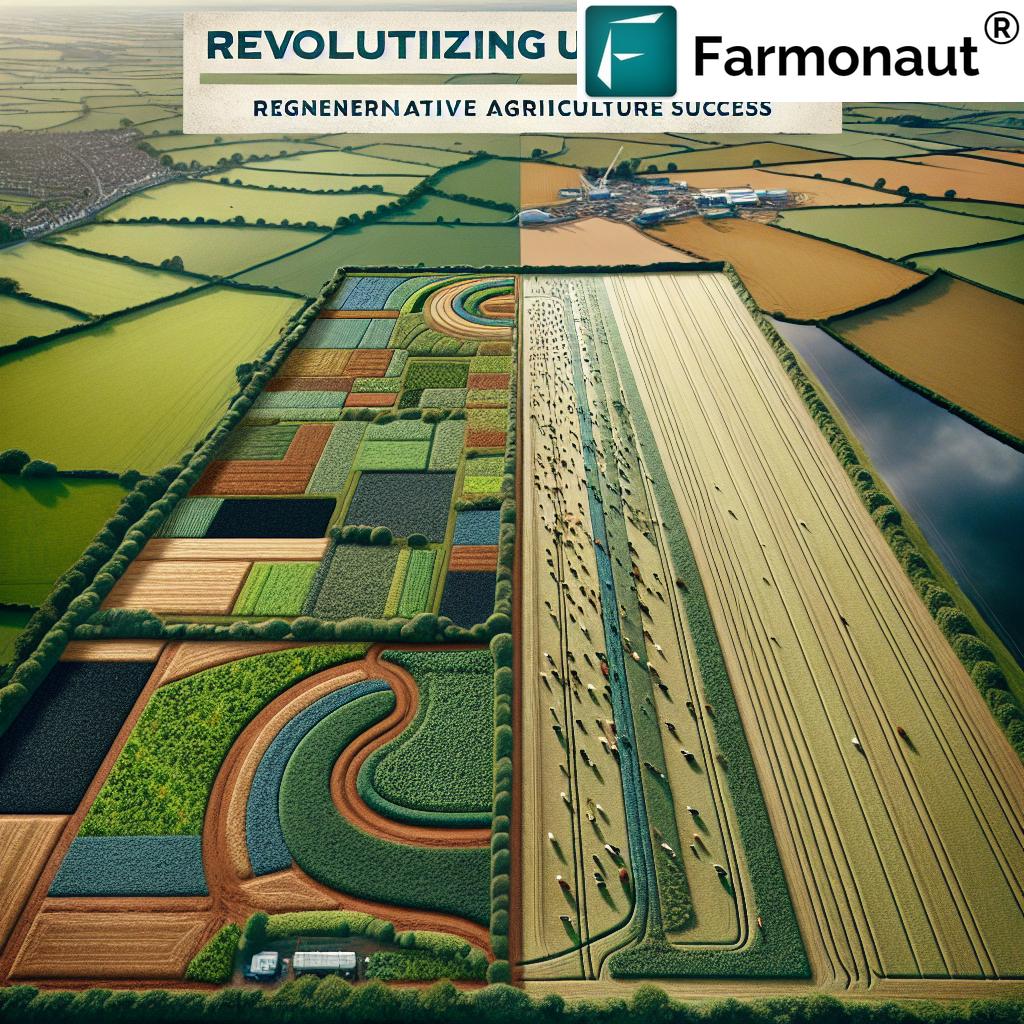Revolutionizing UK Farming: ADM’s Powerful Regenerative Agriculture Program Exceeds Goals, Boosts Sustainability
In a groundbreaking development for UK farming, ADM’s regenerative agriculture program has surpassed its initial objectives, marking a significant milestone in the pursuit of sustainable agriculture. This success story showcases the power of innovative farming practices and their potential to transform the agricultural landscape across the United Kingdom.

The Rise of Regenerative Agriculture in the UK
The UK regenerative agriculture success story began just over a year ago when ADM launched its ambitious program. Since then, the initiative has gained remarkable traction, with more than 260 farmers embracing the cause. This enthusiastic response underscores the growing recognition among UK farmers of the vital role that regenerative practices play in securing a sustainable future for agriculture.
The ADM sustainable farming program focuses primarily on oilseed crops and milling wheat, two staples of UK agriculture. By implementing regenerative practices, farmers are not only improving their yield and profitability but also contributing to broader environmental goals such as:
- Enhancing soil health
- Improving water quality
- Promoting biodiversity
- Reducing carbon emissions
Incentivizing Sustainable Practices
One of the key factors driving the success of ADM’s program is its innovative approach to incentivizing farmers. Participants receive payments for each hectare farmed using regenerative methods, providing a tangible financial benefit for adopting these practices. Additionally, ADM offers technical support to help farmers implement these methods effectively on their farms.
A crucial aspect of the program is the promotion of cover crops, which play a vital role in supporting soil health and increasing carbon sequestration in UK agriculture. By incorporating cover crops into their rotation, farmers can improve soil structure, reduce erosion, and enhance the overall health of their land.

ADM’s Global Ambitions
The success of the UK program has bolstered ADM’s confidence in its global regenerative agriculture initiatives. The company has set an ambitious target of 3.5 million acres under regenerative practices by 2024, with a new goal of reaching 5 million acres by 2025. This expansion from North America to Europe and beyond demonstrates ADM’s commitment to fostering sustainable agriculture on a global scale.
Jonathan Lane, managing director of ADM Agriculture, emphasized the company’s dedication: “ADM is committed to supporting farmers in our effort to create a more sustainable and resilient food system, and our UK experience gives us confidence as we seek to continue to scale up our efforts globally.”
Measurable Impact on GHG Emissions
The GHG emissions reduction in agriculture achieved through ADM’s regenerative agriculture initiatives in 2023 has been substantial. The program’s impact was equivalent to removing more than 135,000 cars from the road for an entire year. This remarkable achievement highlights the potential of regenerative practices for wheat production and other crops in mitigating climate change.
To learn more about innovative agricultural solutions, check out the Farmonaut web app:
Leveraging Technology for Sustainable Farming
A key component of ADM’s success in implementing regenerative agriculture is the use of advanced technology, particularly remote sensing in sustainable farming. By partnering with companies offering remote sensing agriculture capabilities, ADM provides farmers with valuable insights into their carbon footprint and sustainability performance.
This data-driven approach enables farmers to make informed decisions about their practices and helps ADM’s customers understand the environmental impact of their supply chains. The use of novel practice verification techniques, such as remote sensing, allows for scalable solutions that can be applied across large areas of farmland.
For those interested in exploring remote sensing technologies for agriculture, consider trying the Farmonaut Satellite API. You can find detailed information in the API Developer Docs.
Soil Health Improvement Techniques
At the heart of ADM’s regenerative agriculture program are various soil health improvement techniques. These practices are designed to enhance the quality and fertility of the soil, which is fundamental to sustainable and productive farming. Some key techniques include:
- Minimal tillage or no-till farming
- Crop rotation
- Use of cover crops
- Integrated pest management
- Precision nutrient management
By implementing these techniques, farmers can improve soil structure, increase organic matter content, and enhance water retention capacity. This not only leads to better crop yields but also contributes to long-term sustainability and resilience of the farming system.
Supporting the Transition to Regenerative Agriculture
The impact of ADM’s program extends beyond the farm gate. Commercial bakeries and other sectors in the food industry are increasingly looking to support the transition to regenerative agriculture across their supply chains. In response, ADM’s program is promoting the adoption of regenerative practices across its UK grower supply base, which supports its six flour mills across the United Kingdom.
This initiative builds upon ADM’s Sustainable Wheat Project, introduced in 2021, which brings UK farmers together to map their carbon footprints over three years and identify ways to lower emissions. The combination of these programs is driving a significant shift towards more sustainable wheat production in the UK.
To stay updated on the latest agricultural technologies, download the Farmonaut app:
The Future of UK Farming
As ADM’s regenerative agriculture program continues to grow and evolve, it is clear that this approach represents the future of UK farming. By combining traditional agricultural knowledge with cutting-edge technology and sustainable practices, farmers are not only improving their own operations but also contributing to global efforts to combat climate change and ensure food security.
The success of this program in the UK serves as a model for other regions and demonstrates the potential for large-scale adoption of regenerative practices. As more farmers embrace these methods, we can expect to see continued improvements in soil health, biodiversity, and overall agricultural sustainability.
Conclusion
ADM’s regenerative agriculture program in the UK has proven to be a resounding success, exceeding initial goals and paving the way for a more sustainable future in farming. By incentivizing farmers, providing technical support, and leveraging advanced technologies, ADM is driving significant changes in agricultural practices across the country.
The program’s focus on soil health, carbon sequestration, and GHG emissions reduction is not only benefiting individual farmers but also contributing to broader environmental goals. As the program continues to expand and evolve, it holds the promise of transforming UK agriculture into a model of sustainability for the rest of the world.
For UK farmers interested in joining this revolutionary movement, ADM encourages reaching out to their farm trader or emailing ClimateSmartuk@adm.com to learn more about how they can enroll in the regenerative agriculture program.


